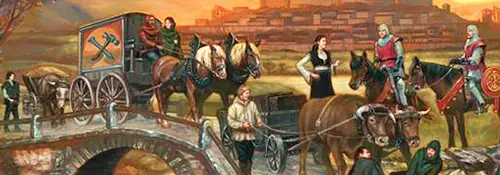
Flexible Bank Resource Trading
The Standard Rules requires that the 4 (or 3 with a port) resources traded be the same to receive 1 of your choice from the bank.
Option 1: Allow any mixture of resources to be traded at the standard rate.
Option 2: Allow any mixture of resources to be traded at the standard rate plus an additional resource.
Pirate & Bandit Expires

The Standard Rules state that the Pirate & Bandit stay in place until moved.
Option 1: Allow the Pirate & Bandit to expire after adversely affecting a player a number of times like 1, 2 or 3.
Option 2: Allow the Pirate & Bandit to be bribed to leave, by giving the desired Pirate or Bandit 2 or 3 resources and removing them from the board. This can be used with Option 1 as well.
Pirate & Bandit Moves
The Standard Rules do not have the Pirate & Bandit moving except as directed by the players.
-
Option 1: On a roll of "7" whichever of the Pirate or Bandit is not moved may move to an adjacent hex. After deciding which roll corresponds to each surrounding hex, roll one die and move the token to the rolled hex.
If the move is not applicable, such as the Pirate on land or the Bandit at sea, the token does not move.
-
Option 2: If using the bribing of Pirate & Bandit in the Pirate & Bandit Expires Option, when one is bribe, if will move instead as list in option 1 or removed if the rolled hex is invalid for the token. This can be used with Option 1 as well.
Settlement & City Defense

The Standard Rules provide for no defense for a city from the effect of Pirates & Bandits.
-
Option 1: Permit a player to deploy an army permanently in a settlement or city. This can be done with a chip or other marker placed under the settlement or city. The effect this has is that the settlement or city is totally unaffected by the effects of the Pirate & Bandit. The used army either may or may not still be counted in the most army calculation.
-
Option 2: A player with an unexposed army can immediately play the army exposed, pre-empting the play of Pirate or Bandit, and allowing that player to place that token on any hex except the hex where it started or any hex that was pre-empted this turn.
This can be used with Option 1 as well.
Equal Probability Number Chits
The Standard Rules provide that some number chits are more likely to occur than others.
Option: Use number chits from 1 to 9 in sufficient quantities to apply to the land hexes. Roll a ten-sided die instead of two six-sided dice for determining which hexes produce resources. On a 10 the normal effects of a "7" on two dice is used.
Permanent Road Placement
The Standard Rules states that once played, a road remains for the remainder of the game.
Option: A player can choose to remove a road. The road is returned to the player's out of play pieces. This can be useful if the player is out of roads.
Competition Board Layouts
Try the following options for official competition board layouts. This can be used with Settlers, Seafarers, or Seafarer discovery scenarios.
- Standard Rules, competition official deploys tile according to random setup in rules. I feel this one has the potential to be the most unbalanced.
- Standard Rules, each round uses same setup (created per rules or design by competition officials)
- Variable Layout Option, competition officials create the layout. Same layout used by all boards in a round.
- Variable Layout Option, players create layout.
When competition officials create a layout, it is recommend that they playtest the layout prior to the competition and make sure it is fairly balanced.
Different Victory Conditions
Victory points required based on the number of players and the length of game desired. You should decide what the target is before play begins. If it is not discussed, it is 10 for 3 or 4 players and 20 for 2 players.
The longer the version the more significant becomes the "Pick a Card" deck.
| Length of Game | 2 Player | 3 player | 4 player |
|---|---|---|---|
| Short | 16 | 10 | 8 |
| Normal | 20 | 13 | 10 |
| Medium | 24 | 16 | 12 |
| Long | 28 | 20 | 14 |
If there are ways to earn additional victory points, you may want to add to the total listed.
Note that with the 3 player medium or long version, additional settlement, city, and roads markers are needed (unless at lot of use of the "Pick a Card Deck" is desired or sufficient opportunities to ear bonus victory points).
For Competitions, I would recommend 4 player-normal, 4 player-medium, or 4 player-long.
Solo Game
A neutral player is pre-set on the board with 1 Town (roll for location).
Each turn, the neutral player receives a free Worker and claims the closest uncontrolled tile.
One worker (bordering a player-owned or free tile) may be removed per turn for a bribe of 4 gold.
The game ends when either the player scores enough points or no free tiles remain.

Team Game
Seating should alternate between teams (no team should take consecutive turns).
Each color begins with 1 additional Town and Worker per added player.
Resources and units are managed individually by players, but players are scored as a team.
Completed routes between settlements allow for the transfer of resources within a team.
Toll Roads
Adds the ability to use other players' routes, for a fee. Each time a route is used, the player borrowing the route must pay the owner a toll:
- using an unoccupied route costs 1 gold
- using a route occupied by a Knight, Bridge, or Fort costs an extra 1 gold
- using a route occupied by a settlement costs an extra 2 gold
Players may choose to negotiate trades in place of tolls (one-time or ongoing).
War of Catan
This adds the ability of Knights to attack other players.
In place of moving, a Knight may attack a piece occupying an adjacent route or intersection. Combat is by dice roll (highest value wins).
If a settlement loses combat, its owner gives up 2 resources; any other losing piece is removed.
When attacked, players may choose to pay 2 gold to avoid combat and remove the Knight.
Any piece removed returns to its owner's hand and may be played again on the next turn.
Seasons
Replaces resource rolls with four themed draw-decks that mimic seasons (assigned by color).
| Red / Spring | - | sheep 2 | - | brick | stone |
| Blue / Summer | wood 2 | sheep | wheat | - | - |
| Orange / Fall wood | - | wheat 2 | brick | stone | |
| White / Winter wood | - | - | brick 2 | stone 2 |
Resources are distributed to all players for each draw. Workers only receive resources when a matching card is drawn.
Specialization
This locks players into a single type of settlement for added challenge. Players draw a card to decide on their emphasis (Green, Blue, Yellow, or player choice).
- Green players start with 1 Town and a Town Hall, only build Towns, and may build bridges.
- Blue players start with 1 City and a Dock, only upgrade to Cities, and may build Forts.
- Yellow players start with 1 Port and a Chapel, only upgrade to Ports, and may build Ships.
Routes may be built along mountain or ocean tiles (cost doubles unless requirements are met).
Mercenaries
Takes the Basic or Advanced Game and adds the ability to gain units and points by development.
Option: Players may spend commodities to buy Development cards (white). Players may play a Soldier Card to get 1 mercenary of their choice (Worker, Knight, Merchant).
Option: Players may spend commodities to buy Development Tokens or Cards (green, blue, or yellow). Players must meet requirements to buy Cards (green = 1 Town, blue = 1 City, yellow = 1 Port). Each Token is worth 1 victory point and gets a bonus or unit without prerequisites:
- Guild Hall 1 free Worker
- Chapel 1 free Knight
- Dock 1 free Merchant
- Garrison (place under a settlement) when attacked, you may reroll combat 1 time
- Town Hall provides 2 extra gold per turn
Caravans

Adds the use of Wagons to secure trade at foreign locations.
Camels (1 victory point) are placed on tiles with low roll probabilities (2, 12, 3, 11) to mark foreign locations.
Players must build a route to each foreign location and move their Wagon there to gain points.
The first Wagon to reach a foreign location receives the Camel. Wagons remaining at a foreign location receive a chosen resource per turn (or Camel if rolled).
A Camel is also awarded each time a player builds a route to another player's settlement.
The Market
The robber token is now The Market. This basically turns most of the "negative" aspects of the robber into positive aspects. Here is a list of changes to the rules:
-
When The Market is on a terrain hex whose number is rolled, instead of blocking that terrain hex from producing resource cards, production is doubled.
Example: A blue city and a red settlement are bordering a mountain hex with the number 11 on it. When an 11 is rolled, this hex would normally produce 2 ore cards for blue and 1 ore card for red. When The Market is on that mountain hex, and an 11 is rolled, a total of 4 ore cards are produced for blue and 2 ore cards are produced for red.
-
When The Market is moved to a terrain hex (via a Soldier card or a roll of 7), instead of stealing a random resource card from a player (whose city or settlement borders that terrain hex), a copy of that resource card is taken from the bank.
If The Market is placed on a terrain hex by a player that has no cities or settlements of other players, no resource card is taken.
-
When a 7 is rolled, players with too many resource cards (8 or more) still have to discard half their resource cards (rounded down). This is now called a "Market Crash".
Poverty
Requirements: 30 red chips.
If a player doesn't receive a Raw Material card during the Raw Material Phase, he gets a Red Chip. If a 7 is rolled, all players get a Red Chip.
The Red Chips can be used to name the Raw Material pay-off number, instead of actually rolling the dice.
At the start of his turn, a player pays the number of Red Chips equivalent to his Victory Point total (This includes Biggest Knight Army, Longest Trade Route, and Victory Point Chips. It does not include hidden Victory Point cards).
The player then names the pay-off number and all players receive Raw Materials based on the named number. If any player doesn't receive a Raw Material Card, he gets a Red Chip.
Gold

Requirements: the gold variant requires counters to represent gold pieces. Yellow 8mm cubes are suggested.
Any time the dice are rolled and a player does not receive one of the five regular resources, that player receives one gold piece. The only exceptions are when a 7 is rolled or when a number is rolled and that player would have received a resource, but the robber was blocking the hex where that resource would have been gathered.
At any time on a players turn she may exchange three gold pieces for any one resource of her choice.
Gold may be bartered with other players in the same way as with the other resources.
Continue Reading


